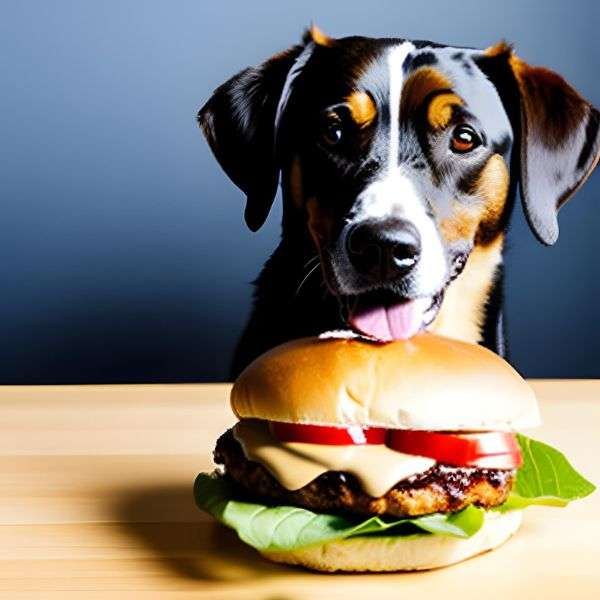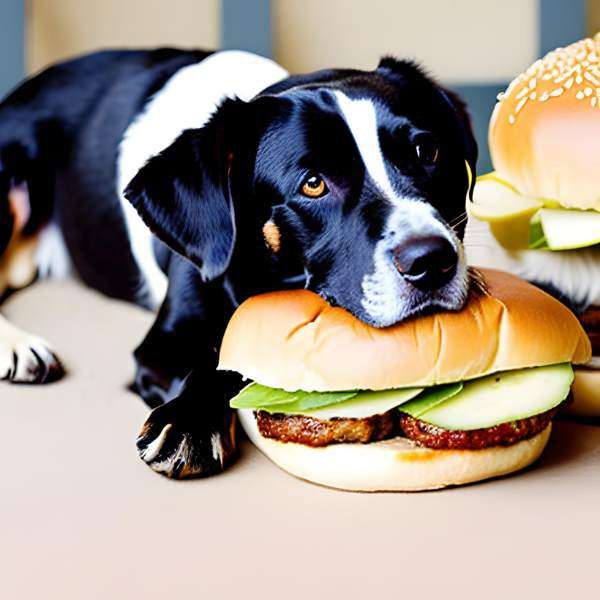Many dog owners wonder, “Can dogs eat burger buns?” the answer to this question is yes! While burger buns alone won’t harm your furry friend, they might not be the best diet.
These soft treats often contain processed grains, sugars, and extras that could upset your pup’s stomach and lead to unnecessary weight gain.
In this article, we will share with you the potential benefits and some possible health risks associated with feeding burger buns to your dog. So without delaying further, let’s delve into the article!
Understanding Burger Buns
Burger buns are commonly used in fast food restaurants and homemade burgers. They are soft, round bread rolls specifically designed to hold the patty, toppings, and condiments that make up a delicious burger.

Burger buns come in various sizes, shapes, and flavors, ranging from classic seed buns to whole wheat or gluten-free options.
Typically, burger buns are made from ingredients such as flour, water, yeast, sugar, salt, and sometimes added fats like butter or vegetable oil. Many people often toast or grill the burger buns before they make a delicious burger.
Can Dogs Eat Burger Buns?
Yes, dogs can eat burger buns in moderation. Burger buns contain high amounts of carbohydrates. However, these carbohydrates may not be ideal for dogs that have specific fits and weight issues.
Additionally, burger buns often contain seasonings, such as onion or garlic, which can be toxic to dogs. It’s good to offer your dog plain buns without any seasonings.
Health Benefits of Burger Buns for Dogs
Burger buns, when given in moderation, can offer some potential health benefits. Here are a few of them:
Carbohydrate Energy:
Burger buns are primarily composed of carbohydrates, serving as an essential energy source for dogs. Carbohydrates provide your dog with energy for daily activities and physical exertion.
Dietary Fiber:
Some burger buns, especially those made from whole wheat or grains, contain dietary fiber. Fiber helps in digestion and can help in regulating bowel movements, promoting a healthy digestive system for your furry friend.

Mental Stimulation:
Burger buns come in various flavors and textures that provide mental stimulation for your dog. Including a small portion of a burger bun as an occasional treat can add variety to their diet and keep them engaged.
Bonding and Socialization:
Sharing a small portion of a burger bun with your dog can strengthen the bond between you and your furry companion.
Weight Management:
If you want your dog to gain some weight, you can add a small portion of it to your dog’s diet as they contain calories that can help achieve this.
However, it’s important to monitor their overall calorie intake and consult with a veterinarian for specific dietary recommendations.
Potential Health Risks of Burger Buns for Dogs Health
While there are some potential health benefits, it’s important to be aware of the possible risks associated with feeding burger buns to dogs. Consider the following:
High Carbohydrate Content:
Burger buns have lots of carbs, and If dogs eat too many burger buns, they might get heavy and too fat. You should be careful about how many burger buns your dog eats, especially if they have health problems.
Seasonings and Additives:
Lots of burger buns have seasonings like onion or garlic in them, which can be bad for dogs’ health. They can hurt a dog’s red blood cells and make them very sick.

Gluten Sensitivity or Allergies:
Some dogs might not feel good with gluten. Gluten is a kind of protein in burger buns made from wheat. If your dog doesn’t do well with gluten, they might have tummy problems, skin issues, or even allergic reactions when they eat things with gluten.
Digestive Upset:
Burger buns, made from very processed white flour, might be hard for some dogs to digest. Eating these buns could make dogs have tummy problems like feeling too full, having a gas, or getting diarrhea.
Nutritional Imbalance:
Burger buns can give energy, but they don’t have all the important stuff that dogs need to eat in a good and balanced diet.
If you give your dog too many burger buns, their nutrition could get mixed up and they might not get all the things they need. This could make them not healthy over a while.
How to Feed Burger Buns to Your Dogs?
Feeding burger buns to your dogs requires caution and careful consideration to ensure their safety and well-being. Follow these guidelines for a responsible approach:

Plain and Unseasoned: You must select plain burger buns without any seasonings, such as onion or garlic. These ingredients can be harmful to dogs. This will help to minimize the risk of any hazards.
Moderation is Key: You should give burger buns only be given to dogs in moderation. They should not constitute a significant portion of their diet. Keep in mind that burger buns are primarily high in carbohydrates and lack essential nutrients.
Small Portions: When offering burger buns, provide small, bite-sized portions suitable for your dog’s size and dietary needs. Avoid giving them large or whole buns, as it may be difficult for dogs to digest or lead to choking hazards.
Watch for Allergies or Sensitivities: If your dog has a known gluten sensitivity or allergy, it’s best to avoid feeding them burger buns altogether. Monitor for any signs of adverse reactions or digestive upset after consumption.
Consult with Your Veterinarian: Before you introduce burger buns or any new food into your dog’s diet, consult with your veterinarian. They can provide specific recommendations based on your dog’s individual needs, dietary restrictions, and overall health.
Best Alternatives of Burger Buns
When it comes to providing safe and healthier options for your dog, several alternatives to burger buns can be both tasty and nutritionally appropriate. Consider the following options:
Lettuce Wraps:
Instead of using burger buns, you should try using big, crunchy lettuce leaves like romaine or iceberg lettuce. These green leaves can be a cool and not-too-many-calorie choice to hold your dog’s favorite fillings.
Sweet Potato “Buns”:
You can use cooked sweet potato slices instead of burger buns. Cut a sweet potato into long slices and gently bake or steam them until they’re soft.
Then, you can use these slices to make a sandwich with your dog’s burger patty or other yummy stuff.

Whole Grain Bread:
If you prefer to stick with bread-like options, choose whole-grain bread specifically formulated for dogs.
You have to look for brands that offer nutrient-rich and minimally processed options without added sugars or artificial ingredients.
Rice Cakes:
Plain rice cakes, made from puffed rice, can be a light and easily digestible alternative to burger buns.
They provide a mild flavor and a crunchy texture that dogs may enjoy. Ensure the rice cakes are free from any added seasonings or flavorings.
Homemade Doggy “Buns”:
Think about making buns just for your dog using things that are good for them, like whole wheat flour, oats, and broth without salt.
You can find many recipes on the internet that are made for dogs and can be changed to match what your dog likes to eat.
FAQS
Can dogs eat burger buns with sesame seeds?
While sesame seeds themselves are not toxic to dogs, it’s best to avoid giving burger buns with sesame seeds. Dogs may have difficulty digesting the seeds, and the added texture could pose a choking hazard.
Are there any health benefits to giving my dog burger buns with whole wheat?
Whole wheat burger buns can provide some dietary fiber, but it’s important to remember that dogs have different nutritional requirements than humans.
Can burger buns cause allergies in dogs?
Burger buns, especially ones with gluten, might make dogs have allergies or feel sensitive. If your dog starts scratching a lot, feeling sick in their tummy, or getting skin problems after eating burger buns, it’s better to not give them those buns and talk to your vet.
Is it safe to give my dog burger buns every day?
No, it’s not a good idea to give dogs burger buns every day. Burger buns have a lot of carbs but not all the good things dogs need to eat right. If dogs eat them a lot, they might get heavy and not have all the right nutrients.
Can burger buns cause digestive issues in dogs?
Yes, burger buns can cause digestive issues in some dogs. The high carbohydrate content and potential difficulty in digestion may lead to bloating, gas, or diarrhea. Monitor your dog’s reaction and consult with your veterinarian if you notice any digestive upset.
Conclusion
In conclusion, It is a safe and soft diet for your dog but moderation is required. It is safe but it can be risky if your dog eats too much.
So you need to be careful in this regard. If your dog eats too much of a burger uns, it can lead to diabetes, depression, digestive problems, or lethargy.
On the other hand, if you give burger buns to you in the right amounts, it can have certain benefits for its health. So make sure your dog gets benefits from the buns.
Hopefully, you have made it here and learned some things from this article! You can visit our other articles as well for more knowledge about different foods.
